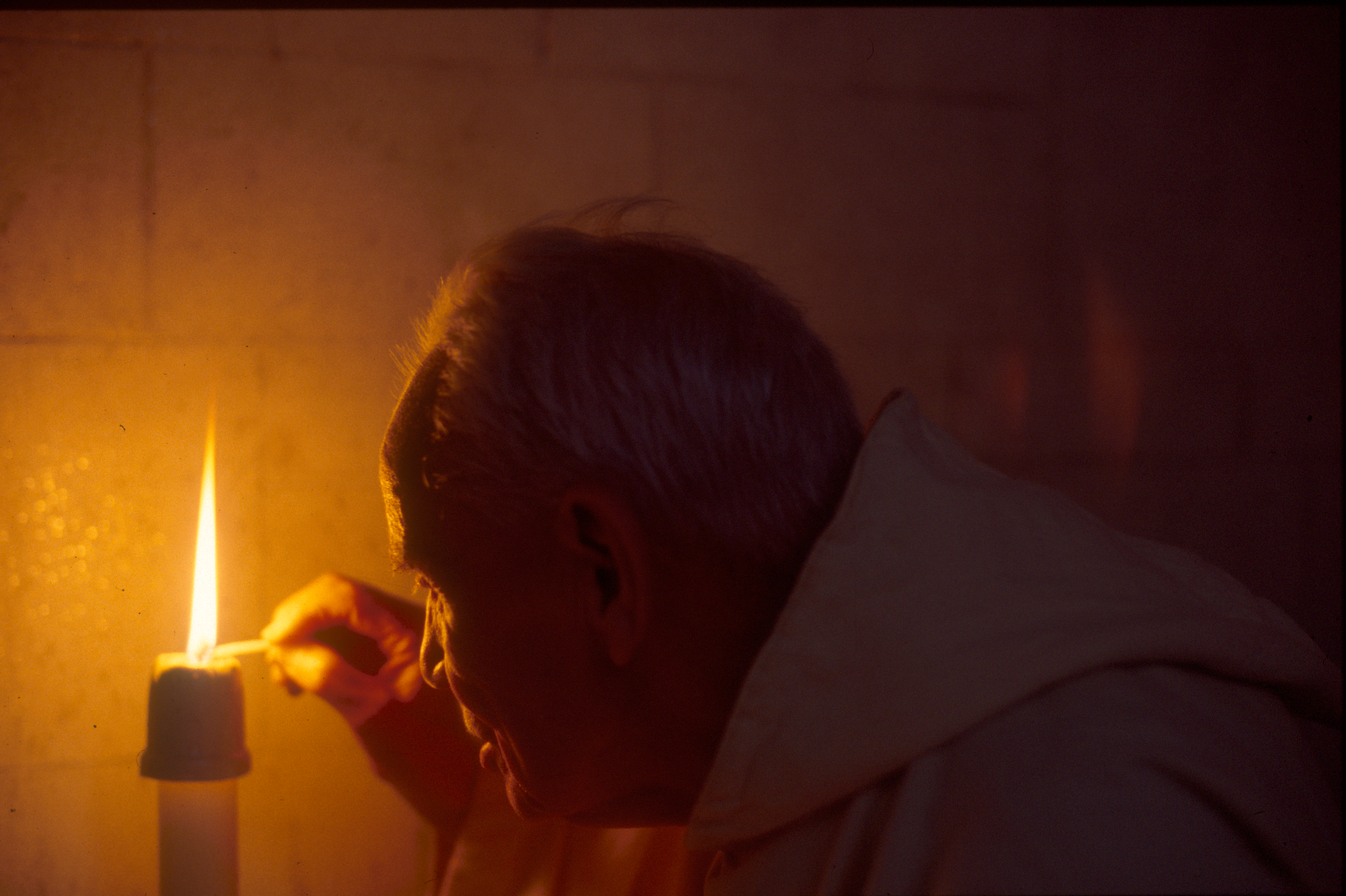Words on the Word
Br Gabriel Manogue RIP
Lamentations 3:17-26: My soul is bereft of peace, I have forgotten what happiness is.
Apocalypse 14:13: They may rest from their labours, for their deeds follow them!
John 6:37-40: For this is the will of my Father, that every one who sees the Son and believes in him should have eternal life.
Our first reading, from Jeremiah’s Lamentations begins with a cry of dereliction. ‘My soul’, says the prophet, ‘is bereft of peace, I have forgotten what happiness is.’ He entreats the Lord not to forget his ‘bitterness, wormwood, and gall.’ Is this not an odd text to use at a requiem Mass for a man who, right into his hundredth year, seemed to be bursting with joy, who radiated peace, whose cheerfulness was wonderfully contagious? The incongruity is more apparent than real. In fact, Jeremiah’s testimony enables us to glimpse the greatness of Brother Gabriel’s profoundly Christian soul. Yes, he was a constant source of gladness for us, his brethren, and for you, his family and many friends. His energy was irrepressible. We all know how he could spontaneously burst into song at any time, anywhere – and in voice production he was not, to cite his own phrase, ‘backward in coming forward’! He was an indefatigable encourager, always ready to see the good in any situation, any person. His joy, however, was not a facile joy. It was no mere optimism or the stubborn resilience of a naturally sunny disposition.
One of my most cherished memories of Brother Gabriel goes back to an evening shortly after I had entered the monastery. We used then to put on the BBC six o’clock news after vespers. Brother Gabriel was an occasional attender. He had been present that evening, while I had gone straight to supper. Having eaten, I met Brother Gabriel in the cloister. He was stooped and walked hesitantly, dragging his feet. When I came close I could see he was weeping. The contrast with the Gabriel I had known until then was so stark that I felt real concern. I walked up to him and asked what was wrong. ‘Seventeen people!’, he replied, visibly distressed: ‘Seventeen people died in that earthquake!’ I fear I have forgotten the particulars of the incident. In some part of the world an earthquake had caused a house to collapse and a group of people to be buried alive. What remains etched on my memory, however, what I hope I shall never forget, is the sight of this good, pure man who had really heard what the newsreader said, and whose heart had at once embraced the grief of it. Such is the heart of a genuine monk. Brother Gabriel’s compassion was immense. He truly carried other people’s sorrow. Anyone who saw him praying in our Lady Chapel, raising clenched fists to the sky while clutching his rosary, has some idea of the commitment with which he stormed heaven in the interest of intentions entrusted to him. He turned his tears into mighty prayers.
There was more, then, to Brother Gabriel’s joy than the gift of a bright temper. And so we come back to Jeremiah. ‘This I call to mind, therefore I have hope: the steadfast love of the Lord never ceases, his mercies never come to an end; they are new every morning; great is thy faithfulness.’ This creed was the core of our brother’s existence. It enabled him to make wormwood sweet. How? By letting even bitter pain be transformed in the furnace of divine love. Brother Gabriel’s response to the Lord’s faithfulness was the faithful gift of his own life. Some of us, workers of the eleventh hour, may yield to a dizzy-spell on remembering that Brother Gabriel entered this house in 1937 and has lived here ever since. For him, the monastic life was no confinement but a broad, open space opening onto eternity. His fidelity provided a secure grounding from which he fearlessly embraced change. He was buoyant to the end, eager to keep learning. He spent countless hours in his place in the refectory reading the Scriptures or some other book he had picked up on his peregrinations round the house, going to pray the rosary with guests or popping in to salute Our Lady of Fatima, whose statue in our classroom he adorned with flowers in a jam jar.
The mercy on which our brother lived formed every dimension of him. Even during his last days, when his body was gently shutting down, there was a compelling graciousness about him. Many of us felt what one of the wonderful Shepshed Carers said a few days ago, after helping turn Brother Gabriel over in bed: ‘Such peace! I just don’t want to leave him!’ This chimes in with something St John says about Jesus. It is the Father’s will, we heard in today’s Gospel, that ‘everyone who sees the Son and believes in him should have eternal life.’ ‘Everyone who sees.’ Any Christian who truly carries Christ has a share in his attractiveness. Simply by seeing them we are moved. We wish to stay with them, to make their secret our own. Brother Gabriel’s secret, fortunately, is an open one. We can share it by building our lives as he built his, on the certainty of God’s all-conquering love, manifest in Christ’s incarnation and made present with mysterious intimacy through the agency of the Mother of God. Since his stroke on 12 June, Brother Gabriel really had only one thing to say: ‘Thank you! Thank you very much!’ Even when speech was difficult, he repeated those words constantly, to everyone. As we commend this good and lovable man, this true monk, to God’s mercy, let us give thanks in our turn, rejoicing in the gift his life has been to us. May he rest in peace! Amen.

